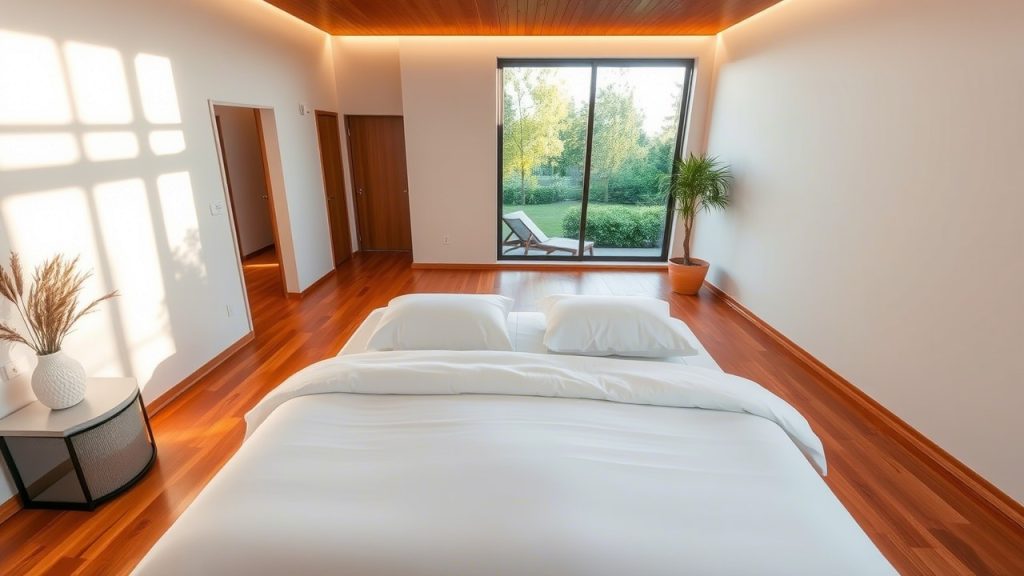Bed Placement According to Feng Shui – Where Should You Sleep?
Feng Shui, an ancient Chinese practice, has been a cornerstone of interior design and space planning for thousands of years. It is based on the belief that the arrangement of your surroundings can influence your energy, health, relationships, and prosperity. One of the most important aspects of Feng Shui is the placement of furniture, particularly the bed. Since sleep plays such a crucial role in our physical and emotional well-being, getting the right bed placement according to Feng Shui can significantly impact the quality of your rest and overall life.
We will dive deep into the principles of Feng Shui when it comes to bed placement. We’ll discuss the key Feng Shui guidelines for where you should place your bed, the factors that influence the flow of energy (or chi) in your bedroom, and the dos and don’ts of bed positioning. Plus, we’ll answer 9 frequently asked questions to help you understand how to improve your sleep environment using Feng Shui principles.
Why is Bed Placement Important in Feng Shui?
In Feng Shui, the bed is viewed as the most important piece of furniture in your home. Your bedroom is a space that should encourage relaxation, rest, and rejuvenation, and the bed is the focal point of that experience. How your bed is positioned in the room can affect your energy levels, sleep quality, and overall harmony in your life.
According to Feng Shui, the right bed placement promotes positive energy flow (chi), while poor placement can lead to disruptions in sleep, stress, and a feeling of imbalance. The practice of Feng Shui is centered around harmony, and your bedroom’s energy can either support or hinder your physical and emotional health based on how the room is organized.
Key Feng Shui Principles for Bed Placement
There are several important principles to consider when choosing where to place your bed. These guidelines not only enhance the flow of positive energy in your bedroom but also create an environment conducive to deep, restful sleep.
1. The Command Position
The command position is one of the most critical concepts in Feng Shui. It refers to placing your bed in a position where you can see the door to the room, but you are not directly in line with the door. This position makes you feel more secure and in control of your environment, which is essential for restful sleep.
To achieve the command position:
- Place your bed with the headboard against a solid wall, ideally opposite or diagonal from the door.
- Avoid placing the bed directly in line with the door, as this can create a sense of vulnerability and disrupt the flow of positive energy.
- If it’s impossible to achieve the command position due to the room’s layout, consider using a full-length mirror to reflect the door’s view.
This position allows you to sleep soundly without feeling startled or stressed from unexpected movements in the room, promoting a sense of calm and safety.
2. Solid Headboard for Support
In Feng Shui, the headboard of your bed represents support in life. A sturdy, solid headboard (preferably made of wood or upholstered material) symbolizes a strong foundation for your well-being, both physically and emotionally. Avoid beds without headboards or beds with flimsy, broken, or too-low headboards, as they can create feelings of insecurity and instability.
- Wooden headboards are ideal as they represent stability and grounding energy.
- Upholstered headboards can bring in comfort and softness to your space, encouraging relaxation.
- Avoid metal headboards, especially if they’re too sharp or angular, as they can create harsh energy in your sleeping environment.
The headboard should be high enough to give you a sense of strength and support. It also prevents energy from escaping and allows you to recharge during the night.
3. Avoid Sleeping Directly Under a Window
Windows are important in Feng Shui because they are associated with the flow of energy. However, sleeping directly under a window can be disruptive to your energy and lead to poor sleep quality. The reason for this is that windows represent unstable energy, and the view of the outside world can cause distractions that make it harder for you to rest.
- If you have to place your bed near a window, make sure the bed is not directly under it. This allows for the energy in the room to remain stable.
- Close your curtains or blinds at night to prevent the outside energy from disturbing your rest.
- If possible, position your bed so that the window is on the side of the bed rather than directly above or in front of it.
By minimizing the impact of the window’s energy, you can create a more stable and restful sleeping environment.
4. Avoid Sleeping Under Exposed Beams or Ceiling Fans
Feng Shui principles also warn against sleeping under exposed beams or ceiling fans. Exposed beams are considered to create negative energy because they appear as if they are “pressing down” on you. This can lead to feelings of discomfort, stress, or even physical tension, resulting in poor sleep.
Similarly, ceiling fans can disturb the flow of energy, especially if they are above your head while you sleep. They may also cause a feeling of “overwhelm,” as the constant movement may prevent the peaceful rest you need.
- If you have exposed beams, consider adding fabric or soft elements to the room to soften their effect.
- Opt for a ceiling fan that is higher up and not directly above your bed to minimize the negative impact on your energy.
5. Balance the Room with Symmetry
In Feng Shui, balance and symmetry are essential for creating harmony in a room. When arranging your bed, try to ensure that both sides of the bed are accessible and that you have nightstands or lamps on either side of the bed. This creates balance and allows energy to flow freely on both sides of the bed.
Avoid placing furniture or large items like wardrobes on only one side of the bed, as this can create an imbalance in your space. This imbalance may manifest as unease in your emotional state, relationships, or financial prosperity.
6. Keep the Area Around Your Bed Clean and Uncluttered
Clutter can block the flow of positive energy (chi) and create feelings of chaos or stress. In Feng Shui, it’s important to keep the area around your bed clean, tidy, and free from unnecessary clutter. This includes the space under the bed.
- Keep your bedside tables free of unnecessary items, such as piles of books or magazines.
- Avoid storing things under the bed unless absolutely necessary, and keep it clear of junk. Storing things under the bed can create stagnation in the energy flow and lead to physical or emotional blockages.
A clean and organized space fosters a sense of peace and tranquility, promoting restful sleep and better health.
7. Position Your Bed Away from the Door
In Feng Shui, it’s essential that your bed is not directly aligned with the door. This is because the doorway represents the entry point for energy, and being directly in line with it can lead to a sense of vulnerability and unease. The energy from the doorway can affect the flow of chi and disrupt your rest.
If your room is small and you can’t avoid positioning the bed in line with the door, try to incorporate a curtain or screen to block the direct view of the door from the bed. This way, the energy from the door is filtered, and you can maintain a sense of safety and calm.
8. Choose Earthy and Calming Colors
While not strictly related to bed placement, the color scheme of your bedroom plays a role in Feng Shui. Opt for calming, restful colors that promote peace and relaxation. Earth tones such as beige, soft brown, light green, and warm whites are ideal for creating a soothing atmosphere.
- Avoid using overly bright or stimulating colors such as red or neon shades in the bedroom, as they can create restless energy.
- Light shades of blue or lavender are also great for promoting restful sleep.
These colors create a serene environment that supports both physical and emotional rejuvenation.
Frequently Asked Questions
1. What is the best direction for my bed to face in Feng Shui?
The ideal direction for your bed depends on your Kua number (which is based on your birth year and gender). However, in general, the best direction is one where you can see the door without being directly in line with it. This is known as the command position, which provides a sense of control and safety.
2. Can I place my bed in front of a window if I have heavy curtains?
While heavy curtains can block external distractions, it is still advisable to avoid placing your bed directly under a window. Even with curtains, windows are associated with unstable energy, which can disrupt sleep quality.
3. How far should my bed be from the wall?
Ideally, your bed should be against a solid wall to provide support and stability. However, leaving a small gap between the bed and the wall (about a few inches) can help with airflow and cleanliness. Avoid having your bed directly in the middle of the room with no wall support behind it.
4. Is it bad to have a mirror facing the bed?
Yes, mirrors facing the bed can disrupt sleep in Feng Shui. They can reflect your energy and cause restlessness or bad dreams. If possible, avoid mirrors directly facing your bed, or use a cover or curtain to block the reflection while you sleep.
5. Can I sleep with my head pointing north?
In Feng Shui, sleeping with your head pointing north is generally not recommended because it is believed to align the body’s magnetic field with the Earth’s magnetic field in a way that might disrupt your energy. It’s better to have your head facing south, east, or west.
6. What type of bed is best for Feng Shui?
A solid wooden bed frame is considered ideal in Feng Shui. It provides support and stability. Avoid metal bed frames with sharp edges, as they can create sharp energy, leading to stress and imbalance.
7. How should I arrange my bedroom furniture in Feng Shui?
In addition to the bed, arrange other furniture such as nightstands, dressers, and lamps in a way that promotes balance and symmetry. Avoid clutter and ensure that the flow of energy is unrestricted.
8. Can I use Feng Shui principles in a small bedroom?
Yes, Feng Shui can be applied in any size room. In smaller bedrooms, it may require more creativity, but key principles such as the command position, avoiding clutter, and choosing calming colors are still very effective.
9. What are the best Feng Shui plants for the bedroom?
Plants can be a great addition to a bedroom, as they promote vitality and growth. Peace lilies, lavender, and snake plants are particularly beneficial in the bedroom, as they help purify the air and create a calming atmosphere.
Conclusion
Feng Shui bed placement is an essential aspect of creating a harmonious and restful bedroom environment. By following the principles of Feng Shui, such as ensuring the bed is in the command position, using a solid headboard, and minimizing clutter, you can enhance the flow of positive energy in your bedroom and improve the quality of your sleep.
Remember, the ultimate goal of Feng Shui is balance, so take the time to adjust your bedroom’s layout for a peaceful and supportive environment that promotes both physical and emotional well-being.





